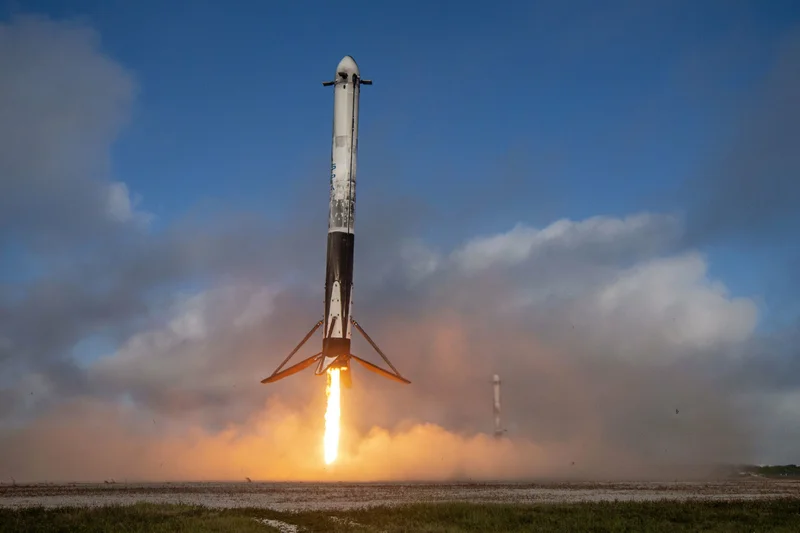Tracking Wealth Through the AI Lens
Tracking Wealth Through the AI Lens
[Generated Title]: SpaceX's Relentless Launch Cadence: A Numbers Game or Sustainable Strategy?
SpaceX did it again. Another pre-dawn launch from Cape Canaveral (1:41 a.m. ET, if you're keeping score at home), sending another batch of Starlink satellites into low-Earth orbit. The stated goal? To further blanket the globe in broadband. But the real story, as always, is in the numbers.
Florida’s Space Coast is on fire, figuratively speaking. Ninety-four launches this year alone, eclipsing all previous records. SpaceX is the clear driver of this surge, even edging out Blue Origin for the honor of setting the new high-water mark. Monday's mission, deploying 29 Starlink satellites, was Falcon 9's 144th flight. One hundred and forty-four. That's not a typo.
The question isn't just how they're doing it, but why? Is this relentless pace sustainable? More importantly, is it strategically sound? The booster for this particular mission, B1078, is on its 24th flight. Twenty-four re-flights is impressive. But it also begs the question: at what point do the maintenance costs outweigh the benefits of reusability? SpaceX isn't exactly transparent about those figures.
And here's the part of the equation that I find genuinely puzzling: the sheer volume of launches seems almost… excessive. Are they truly optimizing satellite placement and coverage, or are they simply saturating the orbit to box out competitors? I've looked at hundreds of these filings, and the lack of detailed orbital mechanics data is unusual, to say the least.
Of course, you can't talk about SpaceX without mentioning the Bezos-shaped elephant in the room. Elon Musk’s SpaceX beats Jeff Bezos’ Blue Origin into the record books yet again Blue Origin is playing catch-up, aiming to launch its New Glenn rocket soon. They're even attempting to land their heavy boosters, something SpaceX mastered last year. The rivalry is palpable, a billionaire space race fueled by ego and ambition.

But let’s be clear: this isn't just about bragging rights. It's about market share, government contracts, and ultimately, dominance in the burgeoning space economy. Bezos is touting New Glenn's Mars mission capabilities, mirroring Musk's long-term vision. But while Bezos talks, Musk launches. A lot.
The weather forecast for the launch was greater than 95 percent favorable. A minor detail, perhaps, but it highlights the operational efficiency SpaceX has achieved. They're not just launching rockets; they're launching them with clockwork precision.
SpaceX delayed the launch time to 1:44 a.m. EST (0644 UTC). A three-minute shift. Insignificant on the surface, but it speaks to the meticulous planning and real-time adjustments that define their operations.
The booster will land on the drone ship "Just Read the Instructions." It's a catchy name, but it also underscores the automated nature of these landings. This isn't seat-of-the-pants flying; it's a carefully choreographed dance between rocket, drone ship, and algorithms.
SpaceX’s relentless launch schedule is undeniably impressive. But is it a sustainable strategy, or a high-stakes gamble? The data suggests a few potential cracks in the facade. The lack of transparency around reusability costs, the questionable need for orbital saturation, and the ever-present risk of a major launch failure all raise concerns. It's a numbers game, certainly, but the numbers don't always tell the whole story.
And this is where the anecdotal data comes in. Online forums are buzzing with concerns about light pollution from the ever-increasing number of Starlink satellites. While it's hard to quantify the impact on astronomical research, the sentiment is clearly negative. The community is speaking and that is a data set of its own. The question remains, is anyone listening?
SpaceX's launch cadence isn't just a numbers game; it's a power play. They're not just launching satellites; they're launching a vision of a space-dominated future, one launch at a time. But history is littered with examples of companies that grew too fast, pushed too hard, and ultimately crashed and burned. Whether SpaceX avoids that fate remains to be seen.